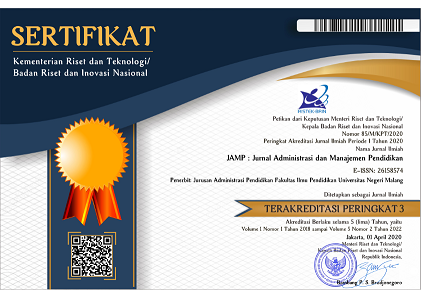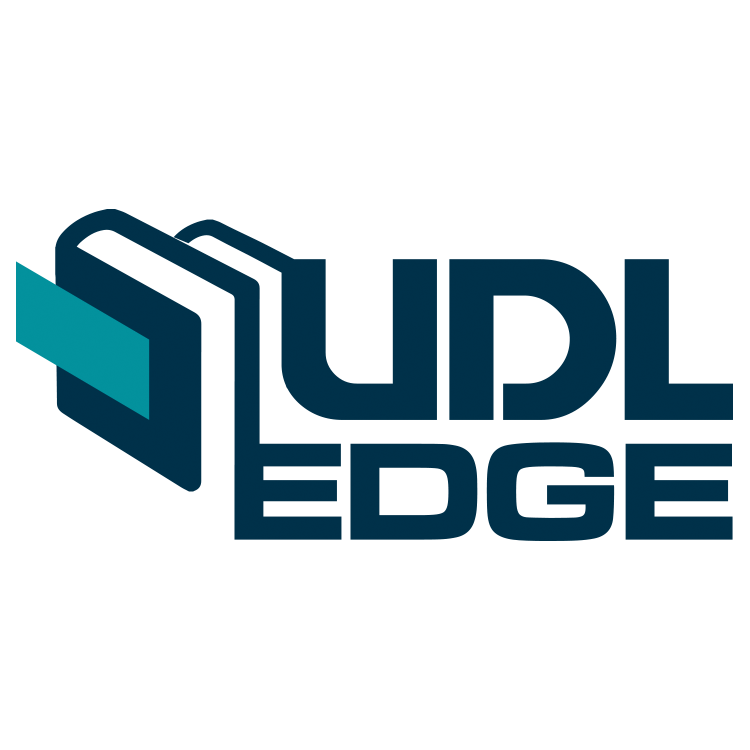KESIAPAN MENGHADAPI PERUBAHAN PADA GURU SEKOLAH DASAR TERHADAP JENIS BUDAYA DAN DUKUNGAN ORGANISASI
Abstract
Abstrak: The study investigates the relation of the readiness for change of an elementary school teacher in Jakarta and its vicinity with the kind of organization culture and organizational support he/she experiences from the school. The background is the context of many changes faced by teachers, as a result from changes of government policies related to education, as well as changes affected by the Covid-19 pandemic. The study is quantitative in nature, through questionnaire and statistical analysis, using readiness for change, competing values framework, and perceived organizational support as constructs. Results suggest that in order to have teachers that are ready to change, the school culture should encourage teachers to innovate and adapt, nurturing a healthy relationship and good team building, appreciating teachers’ effort, and providing a clear target and direction.
Keywords: Readiness for change, competing values framework, perceived organizational support, elementary school teacher.
Abstrak: Kajian ini menyelidiki hubungan kesiapan menghadapi perubahan pada guru sekolah dasar di Jakarta dan sekitarnya terhadap jenis budaya organisasi dan dukungan organisasi yang dialami di sekolah. Latar belakang studi ini adalah banyaknya perubahan yang dihadapi guru, sebagai akibat dari perubahan kebijakan sistem pendidikan, maupun perubahan yang akibat pandemi Covid-19. Studi ini bersifat kuantitatif, menggunakan kuesioner dan analisis statistik serta regresi. Konstruk penelitian adalah readiness for change, competing values framework, and perceived organizational support. Hasil penelitian menunjukkan bahwa untuk memiliki guru yang siap berubah, budaya sekolah harus mendorong guru untuk berinovasi dan beradaptasi, membina hubungan yang sehat dalam team building yang baik, menghargai upaya guru, serta memberikan arah dan sasaran yang jelas.
Kata Kunci: Kesiapan untuk perubahan, kerangka nilai bersaing, dukungan organisasi yang dirasakan, guru sekolah dasar.
Full Text:
PDFReferences
Ali, Ahmad., Ahmad-Ur-Rehman, Muhammad., Ul-Haq, Inam., Jam, Farooq Ahmed., Ghafoor, Muhammad Bilal., Azeem, Muhammad Umer. (2010). Perceived organizational support and psychological empowerment. European Journal of Social Sciences, 17 (2), 186-192.
Aprilianti, A. A., Mangundjaya, W., & Rachmawan, A., (2015). The role of psychological capital and psychological empowerment on individual readiness for change. The Journal of Developing Areas 49(5):343-352. DOI: 10.1353/jda.2015.0063.
Armenakis, A. A., Harris, S. G., & Mossholder, K. W. (1993). Creating readiness for organizational change. Human Relations, 46, 681-703.
Armenakis, A.A, Harris, S.G. (2003). Crafting a change message to create transformational readiness. Journal of Organizational Change Management, 15 (2), 169-183.
Bahron, Arsiah., Jimenez, Myrna. (2010). The influence of perceived organizational support and leader empowering behaviors on psychological empowerment among managers / middle managers in Sabah state civil service. Makalah dipresentasikan pada ICBER (International Conference on Business and Economic Research) 2010, Kuching, Sarawak.
Baron, Helen. (1996). Strengths and limitations of ipsative measurement. Journal of Occupational and Organizational Psychology, 69, 49-56.
Belasen, Alan T. (1998). Paradoxes and leadership roles: assessing and developing managerial competencies. Management Development Forum. 1 (2).
Belasen, Alan T., Frank, Nancy. (2008). Competing values leadership: quadrant roles and personality traits. Leadership & Organization Development Journal, 29 (2) 127-143.
Biro Kerja Sama dan Hubungan Masyarakat Kementerian Pendidikan dan Kebudayaan. Merdeka Belajar untuk Semangat dan Inspirasi Peningkatan Pendidikan 14 Agustus 2020. https://www.kemdikbud.go.id/main/blog/2020/08/merdeka-belajar-untuk-semangat-dan-inspirasi-peningkatan-pendidikan, diakses 28 Oktober, 2020
Cameron, Kim S., Quinn, Robert E. 2011. Diagnosing and Changing Organizational Culture – Third Edition. San Francisco, CA: Jossey-Bass.
Cameron, Kim S., Quinn, Robert E., DeGraff, Jeff., Thakor, Anjan V. 2014. Competing Values Leadership – Second Edition. Cheltenham, UK: Edward Elgar Publishing Company.
Celik, Tayyar, O., Atik, Servet (2020). Preparing teachers to change: the effect of psychological empowerment on being ready for individual change. Cukurova University Faculty of Education. Journal Spring 2020, 49,e1, 73-97.
Chin, W.W., 1998, The Partial Least Squares Approach for Structural Equation Modeling, Cleveland, Ohio.
Churiyah, Madziatul., Sholikhan, Filianti, Sakdiyyah, A. Dewi., (2020). Indonesia Education Readiness Conducting Distance Learning in Covid-19 Pandemic Situation. International Journal of Multicultural and Multireligious Understanding. Volume 7, Issue 6 July 2020, p491-507. http://dx.doi.org/10.18415/ijmmu.v7i6.1833.
David A Squires, William G. Huitt, and K. Segars. (1983). Effective School and Classroom : A Research- Based Perspective. Virgina: Association for Supervision Curriculum Development.
Ding, H., Yu, E., & Li, Y. (2020). Linking perceived organizational support for strengths to task performance. Social Behavior and Personality: An international journal, 48(3), e8906
Eiseberger, Robert., Fasolo, Peter., Davis-LaMastro, Valerie. (1990). Perceived Organizational Support and Employee Diligence, Commitment, and Innovation. Journal of Applied Psychology, 75 (1), 51-59.
Eisenberger, Robert., Huntington, Robert., Hutchison, Steven., Sowa, Debora. (1986). Perceived Organizational Support. Journal of Applied Psychology, 71(3), 500-507.
Eisenberger, Robert., Stinglhamber, Florence. (2011). Perceived Organizational Support: Fostering Enthusiastic and Productive Employees. Washington: American Psychological Association.
Faerman, Lawrence B. (2009). The relationship between organizational culture and effectiveness in university residence hall associations: a competing values study. Dissertation. Florida Atlantic University.
Ghozali, Imam. (2014). Structural equation modeling: Metode alternatif dengan partial least square edisi 4., Badan Penerbit Universitas Diponegoro, Semarang.
Gravetter, Frederick J., Wallnau, Larry B., (2013). Statistics for the Behavioral Sciences 9th edition. California: Wadsworth Cengage Learning.
Hamzah, Suharti, D., Ibrahim, Sani, M., Ghavifekr, S., (2018) Change Orientation And Organizational Climate: Experience From Malaysian Primary Schools. MOJEM: Malaysian Online Journal of Educational Management, [S.l.], 6 (3) p. 83-108.
Hanpachern, Chutima. (1997). The extension of the theory of margin: A framework for assessing readiness for change. Unpublished Doctoral Dissertation, Colorado State University, Fort Collins.
Hartnell, C. A., Ou, A. Y., & Kinicki, A. (2011). Organizational culture and organizational effectiveness: A meta-analytic investigation of the competing values framework's theoretical suppositions. Journal of Applied Psychology, 96(4), 677–694. https://doi.org/10.1037/a0021987
Helfrich, Christian D., Ly, Yu-Fang., Mohr, David C., Meterko, Mark., Sales. Anne E. (2007). Assessing an organizational culture instrument based on the competing values framework: exploratory and confirmatory factor analyses. Implementation Science, 2 (13).
Hofstede, Gert., (2020). Hofstede-Insight, Country Comparison Indonesia., https://www.hofstede-insights.com/country-comparison/indonesia/, diakses 3 November, 2020.
Holt, D. T. & Vardaman, J. M. (2013). Toward a Comprehensive Understanding of Readiness for Change: The Case for an Expanded Conceptualization, Journal of Change Management, 13 (1), pp. 9-18.
Holt, D.T., Helfrich, C.D., Hall, C.G. et al. (2010) Are You Ready? How Health Professionals Can Comprehensively Conceptualize Readiness for Change. J GEN INTERN MED 25, 50–55 . https://doi.org/10.1007/s11606-009-1112-8.
Hustus, L., Chelsea, Owens, S., Julie. (2018). Assessing Readiness for Change Among School Professionals and Its Relationship with Adoption and Reported Implementation of Mental Health Initiatives. Child & Youth Care Forum, 47:829–844 https://doi.org/10.1007/s10566-018-9463-0
Inandi, Y., Gilic. F., (2016). Relationship of teachers’ readiness for change with their participation in decision making and school culture. Educational Research and Reviews. Vol. 11(8), pp. 823-833, 23 April, 2016 DOI: 10.5897/ERR2016.2730
Knight-Turvey, Neal. (2006). Influencing employee innovation through structural empowerment initiatives: the need to “feel” empowered. Makalah dipresentasikan pada 3rd AGSE (Australian Graduate School of Entrepreneurship) International Entrepreneurship Research Exchange, Auckland.
Lizar, Ayu Aprilianti; Mangundjaya, Wustari L. H.; Rachmawan, Ahmad. The role of psychological capital and psychological empowerment on individual readiness for change. Journal of Developing Areas. 2015 Special Issue, Vol. 49 Issue 5, p343-352. 10p. DOI: 10.1353/jda.2015.0063.
Mayers, C. M., Adams, G. B., Sekaja, L., Buzea, C., Cazan, A., Gotea, M., Stefenel, D., Woerkom, V. M, (2019). Perceived Organizational Support for the Use of Employees’ Strengths and Employee Well‑Being: A Cross‑Country Comparison. Journal of Happiness Studies (2019). 20:1825–1841 https://doi.org/10.1007/s10902-018-0026-8
Parahyanti, E. (2010). Pemartabatan dan kesiapan untuk berubah. Unpublished Doctoral Dissertation. University of Indonesia, Depok.
Talesra, H.,(2020). Educational Responses to the Pandemic in India. International Studies in Educational Administration . Volume 48, No. 2, 2020.
Thomas, F., (2020). After the Pandemic, a Revolution in Education and Work Awaits. New York Times. 10/21/2020, Vol. 170 Issue 58853, pA22-A22. 1/4p.
Vakola, M. (2014). What's in there for me? Individual readiness to change and the perceived impact of organizational change, Leadership & Organization Development Journal, Vol. 35 No. 3, pp. 195-209. https://doi.org/10.1108/LODJ-05-2012-0064.
Weiner, B. J., 2020. A theory of organizational readiness for change. Handbook on Implementation Science. University of North Carolina at Chapel Hill.
Widyanuratikah, I., (2015). Nadiem Jelaskan Tiga fokus Perubahan Kurikulum masa Pandemi, Kamis 2 Jul 2020 12:35, Republika. Co. Id , diakses Rabu, 4 nov 2020.
Yongxing, G., Hongfei. D., Baoguo. X., Lei. Mo., (2017) Linking perceived organizational support for strengths used to task performance. Anales de Psicología. 33 (3) p. 708-713. 6p. DOI: 10.6018/analesps.33.3.238571.
Youseff, Leila . (2014) Globalisation and higher education: from within-border to cross-border. Open Learning, 02680513, Jun2014, 29 (2).
Yu, Tianyuan., Wu, Nengquan (2009), A Review of Study on the Competing Values Framework. International Journal of Business and Management. 4 (7). DOI:10.5539/ijbm.v4n7p37
DOI: http://dx.doi.org/10.17977/um027v3i42020p359
Refbacks
- There are currently no refbacks.
Copyright (c) 2021 Wulandini Gouvara, Sahala Harahap, Hilmy Wahdi

This work is licensed under a Creative Commons Attribution-ShareAlike 4.0 International License.


This work is licensed under a Creative Commons Attribution-NonCommercial-ShareAlike 4.0 International License.









12.png)